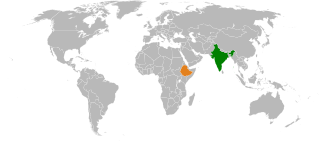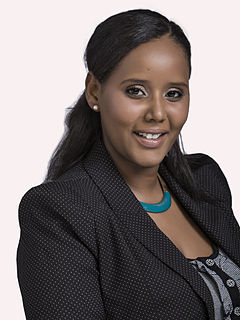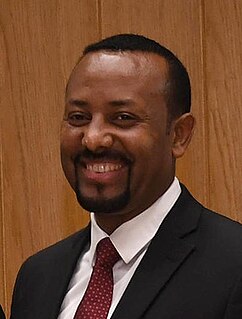Related Research Articles

The politics of Ethiopia are the activities associated with the governance of Ethiopia. The government is structured as a federal parliamentary republic with both a President and Prime Minister.

The Government of Ethiopia is structured in a framework of a federal parliamentary republic, whereby the Prime Minister is the head of government. Executive power is exercised by the government. The prime minister is chosen by the parliament. Federal legislative power is vested in both the government and the two chambers of parliament. The Judiciary is more or less independent of the executive and the legislature. They are governed under the 1995 Constitution of Ethiopia. There is a bicameral parliament made of the 108-seat house of federation and the 547-seat House of Peoples Representatives. The house of federation has members chosen by the state assemblies to serve five year terms. The house of people's representatives are elected by direct election, who in turn elect the president for a six-year term.

Ethiopia, officially the Federal Democratic Republic of Ethiopia, is a landlocked country in the Horn of Africa. It shares borders with Eritrea to the north, Djibouti and Somaliland to the northeast, Somalia to the east, Kenya to the south, South Sudan to the west and Sudan to the northwest. Ethiopia has a total area of 1,100,000 square kilometres (420,000 sq mi) and over 109 million inhabitants and is the 13th-most populous country in the world and the 2nd-most populous in Africa. The national capital and largest city, Addis Ababa, lies several kilometres west of the East African Rift that splits the country into the African and Somali tectonic plates.

The President of the Federal Democratic Republic of Ethiopia is the head of state of Ethiopia. The position is largely a ceremonial one, with executive power vested in the Prime Minister. The current president is Sahle-Work Zewde, who took office on 25 October 2018. Presidents are elected by the House of Peoples' Representatives for six years, with a two term limit.

Meles Zenawi Asres was an Ethiopian politician who was President of Ethiopia and consecutively served as 2nd Prime Minister of Federal Democratic Republic of Ethiopia. He was considered the founder of the ethnofederalism of modern Ethiopia, which is still controversial democratic system due to concerning ethnic conflict and human rights abuses.

The Prime Minister of Ethiopia is the head of government and chief executive of Ethiopia. The Prime Minister is the most powerful figure in Ethiopian politics and commander also the chief of the Ethiopian Armed Forces. The official residence of the prime minister, is Menelik Palace in Addis Ababa. Abiy Ahmed Ali (PhD) is the fourth Prime Minister of the Federal Democratic Republic of Ethiopia Prime Minister since the new constitution formed the Federal Democratic Republic of Ethiopia.

Hailemariam Desalegn Boshe is an Ethiopian politician who served as Prime Minister of Ethiopia from 2012 to 2018. He also previously served as Deputy Prime Minister and Minister of Foreign Affairs under Prime Minister Meles Zenawi from 2010 to 2012. After Meles' death in August 2012, Hailemariam succeeded him as Prime Minister, initially in an acting capacity. He was then elected as the Chair of the EPRDF, the ruling party, on 15 September 2012. Hailemariam also served as the Chairperson of the African Union from 2013 to 2014.

The Ministry of Foreign Affairs is the Ethiopian government ministry which oversees the foreign relations of Ethiopia.

Ethiopian–Turkish relations are foreign relations between Ethiopia and Turkey.

Ethiopia–Mexico relations refers to the diplomatic relations between the Federal Democratic Republic of Ethiopia and the United Mexican States. Both nations are members of the Group of 24 and the United Nations.

Canada–Ethiopia relations are foreign relations between Canada and Ethiopia. Both countries established diplomatic relations in 1956. Canada opened an embassy in Addis Ababa in 1957; although Ethiopia opened an embassy in Ottawa in 1962, it was closed the next year due to financial constraints and not re-opened until 1989. The Ethiopian ambassador is also accredited to: Cuba, Jamaica and the International Civil Aviation Organization.

The 1995 Constitution of Ethiopia is the supreme law of the Federal Democratic Republic of Ethiopia. This document came into force on August 21st, 1995. The constitution was drawn up by the Constituent Assembly that was elected in June 1994. It was adopted by the Transitional Government of Ethiopia in December 1994 and came into force following the general election held in May–June 1995.

Ethiopia–India relations have existed for almost two millennia. Modern diplomatic relations between India and Ethiopia were established at the level of legations in July 1948, after the independence of India. The relationship was raised to the ambassadorial level in 1952. India maintains an embassy in Addis Ababa and Ethiopia in New Delhi. The two countries have enjoyed close and friendly relations with India supporting Ethiopian developmental efforts while Ethiopia has supported Indian interests such as its claim to a permanent seat on the United Nations Security Council. India and Ethiopia share a common understanding on such issues as cross-border international terrorism, the need and direction for reform of the United Nations, and the importance of action on climate change.

Pnina Tamano-Shata is an Israeli lawyer, journalist, and politician. She is currently a member of the Knesset for the Blue and White alliance, and was the first Ethiopian-born woman to hold a Knesset seat. She left Yesh Atid on 29 March 2020 and joined Blue and White. On 15 May 2020 she became Israel's first Ethiopia-born minister in the unity government with Prime Minister Benjamin Netanyahu and incoming deputy prime minister Benny Gantz, taking the portfolio of the Ministry of Aliyah and Integration. She was sworn in as leader of this department, also titled Minister of Immigrant Absorption, on 17 May 2020.

Tedros Adhanom Ghebreyesus is an Eritrean-born Ethiopian biologist, public health researcher, and official who has served since 2017 as Director-General of the World Health Organization. Tedros is the first African in the role; he was endorsed by the African Union. He has held two high-level positions in the government of Ethiopia: Minister of Health from 2005 to 2012 and Minister of Foreign Affairs from 2012 to 2016.

The Council of Ministers is the cabinet of the Government of Ethiopia. Under the Constitution of Ethiopia, the Council of Ministers is the country's executive body.

Abiy Ahmed Ali is an Ethiopian politician serving as 4th Prime Minister of the Federal Democratic Republic of Ethiopia since 2 April 2018. He was the third chairman of the ruling Ethiopian People's Revolutionary Democratic Front and first Oromo to serve in that position from the Oromo Democratic Party (ODP), which was one of the four coalition parties of the EPRDF. Abiy is also an elected member of the Ethiopian parliament, and a member of the ODP and EPRDF executive committees.

Brazil–Ethiopia relations refers to the current and historical relations between the Federative Republic of Brazil and the Federal Democratic Republic of Ethiopia. Both nations are members of the Group of 77 and the United Nations.

The Tigray War is an ongoing armed conflict that began around midnight of 3–4 November 2020 in the Tigray Region of Ethiopia. It is being fought between the Tigray People's Liberation Front (TPLF) which exercised control over the Tigray Regional government, and the Ethiopian National Defense Forces (ENDF) aided by the Ethiopian Federal Police, regional police and gendarmerie forces of the neighbouring Amhara and Afar Regions with the involvement of the Eritrean Defence Forces. All sides have committed war crimes during the conflict.
References
- ↑ "Ethiopian ex-ministers up for corruption". News24. 31 October 2001. Retrieved 11 July 2015.
- ↑ Silver, Cary (February 1998). "Two milestones and a dream". The Rotarian . 172 (2). p. 40. ISSN 0035-838X.